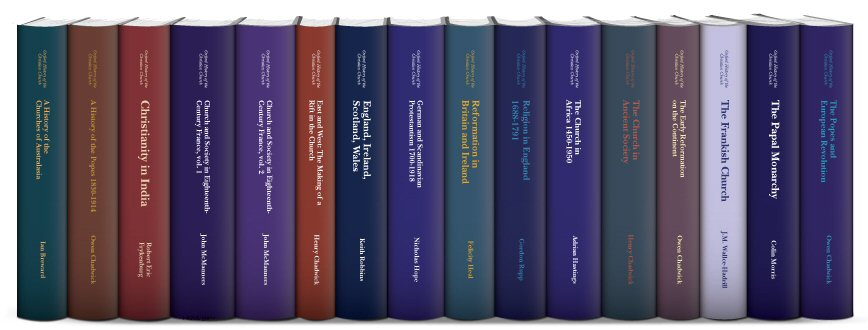Update: in a rare move, Logos has dropped the Pre-Pub price on the Oxford History of the Christian Church collection! Read about it on the Logos Talk blog, and pre-order it while this price lasts.
Church history has a remarkable impact on Christian society today. Indeed, the study of history helps us understand ourselves, our traditions, and how God has moved throughout history, drawing his people to himself. In The Story of Christianity Justo L. Gonzales suggests, “Every renewal of the church, every great age in its history, has been grounded on a renewed reading of history.” Similarly, Henry Chadwick once said in a debate, “Nothing is sadder than someone who has lost his memory, and the church which has lost its memory is in the same state of senility.” Today, with the tools and technology available, delving into the history of the church has never been so accessible, a fact that is sure to reward us in years to come—if we faithfully study this history and apply what is learned.
The 16-volume Oxford History of the Christian Church collection from Oxford University Press, now available for pre-order, provides nearly 10,000 pages of historical survey and study. The volumes present historical accounts with both global and local perspectives, critically engaging a wide variety of topics and locations. In print, this collection is worth over $1,000, but Logos is offering it for hundreds less. You can save even more by pre-ordering the collection, taking an extra 20% off Logos’ regular sale price. With Logos Pre-Publication specials, you will only be charged when the resources are completely ready to be downloaded. Save by pre-ordering the Oxford History of the Christian Church (16 vols.) today.
Book highlight: The Church in Ancient Society: From Galilee to Gregory the Great

As an example, here are two excerpts from Chadwick’s chapter titled “Interpreting Scripture: Philo and Paul,” in which he looks at Philo’s hermeneutic and its possible influence and implications for New Testament authors—primarily Paul. Regarding Philo and his interpretation of Scripture, Chadwick writes:
The goal and purpose of Philo’s allegorizing of the Mosaic Law derived impetus from his desire to reduce to nearly zero the particularism of Jewish tradition. By allegory the Law could be shown to be universal, indeed cosmic in its scope. The claim is explicit in his Life of Moses (2. 19). To obey it was for him the mark of being a citizen of the cosmos (De opificio mundi 1). Therefore there could be no conflict between Moses and the best moral philosophers of classical Greece. Philo was confident that Plato derived his best ideas from the study of a copy of the Pentateuch itself. These were not new themes with Philo. Jewish allegorists before him disturbed him by their opinion that for anyone who had penetrated to the symbolic sense of Moses’ precepts, the precepts themselves were no longer obligatory. Philo preferred to say that, although the Levitical commands concerned the body and the world of sense, nevertheless the body serves the soul and through obedience to the physical precepts of the Law one discerns more clearly the higher truths of which they are symbols (De migratione Abrahae 89–93). Body and soul correspond to the literal and spiritual senses of scripture. (Chadwick, pp. 32–33)
Several pages later, having discussed various New Testament interpretive methods, their interpreters, and contexts, he moves into discussing Paul and his interpretation of Christ in creation. Chadwick implies possible influence of Philo for Paul, though definite deference in interpretation and philosophy.
The calling to be apostle to the Gentiles led Paul to recast the primitive apocalyptic hope of many early Christians, which he himself initially shared (as 1 Thessalonians shows). He reinterpreted the Christ who is the coming end and ultimate judge of the world to be the wisdom of God in the creation. He was thereby preparing the way for the incorporation of the Logos theology of the Hellenistic synagogue, exemplified in the writings of Philo. The doctrine of the last things was modified so that in 1 Corinthians 12 Christ and the Church are identified: the Church is his body, and therefore the last times are already being realized in the life of the community of the Spirit. This realized eschatology extends a line already present in the gospels, where Jesus is the strong man who has bound Satan. (Chadwick, p. 41)
In these excerpts you can see not only how clearly and accessibly Chadwick writes, but also how deftly he navigates the context and issues of the period, tracing correlation and influence without reading into the facts. This kind of careful writing, research, and interpretation is indicative of the rest of this collection, which is edited by Henry Chadwick and his brother, Owen Chadwick. Every volume skillfully presents the information, providing not just an enjoyable and informative read, but also integrating with Logos Bible Software to become an incredibly valuable reference work for years to come.
- The Early Reformation on the Continent by Owen Chadwick
- The Papal Monarchy: The Western Church from 1050–1250 by Colin Morris
- Religion in England 1688–1791 by Gordon Rupp
- Christianity in India: From Beginnings to the Present by Robert Eric Frykenberg
- East and West: The Making of a Rift in the Church: From Apostolic Times until the Council of Florence by Henry Chadwick
For a full list of all the titles in the collection, visit the Oxford History of the Christian Church product page. Place your order today!





